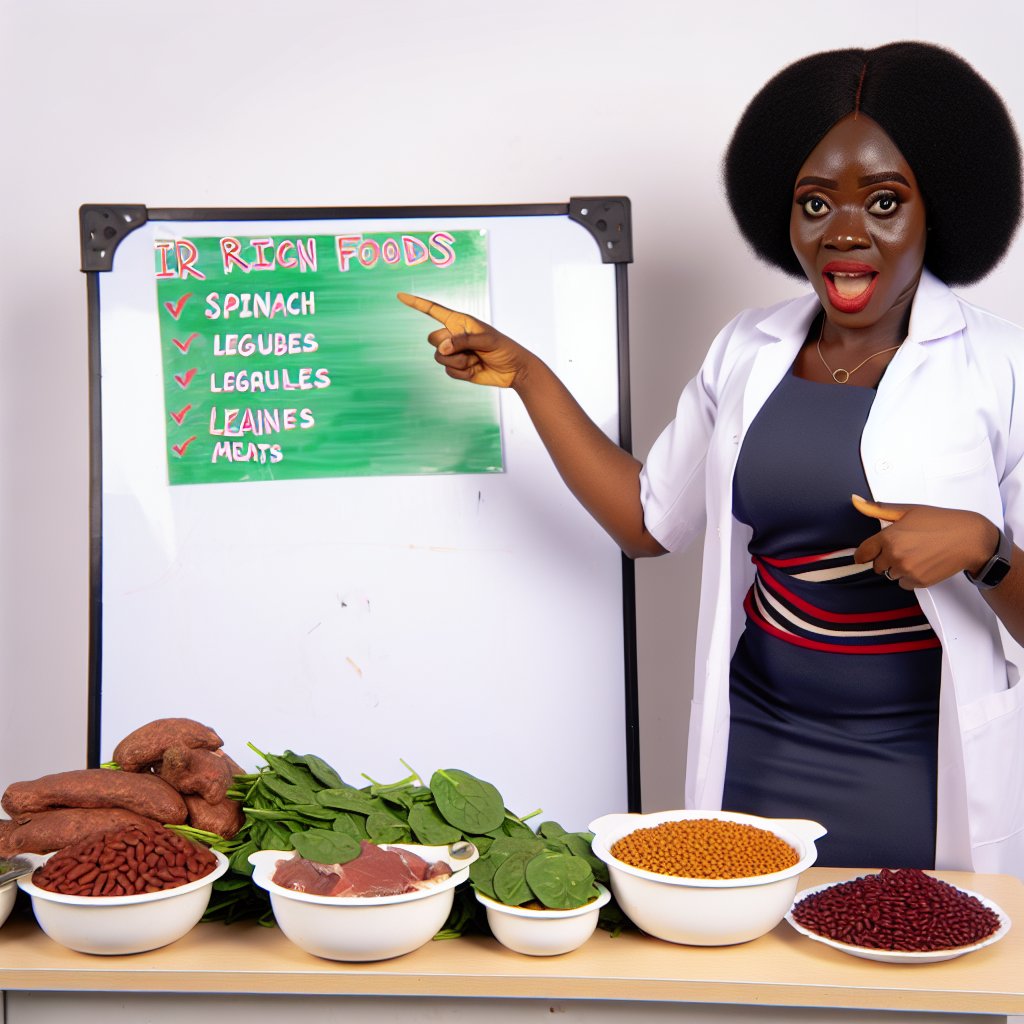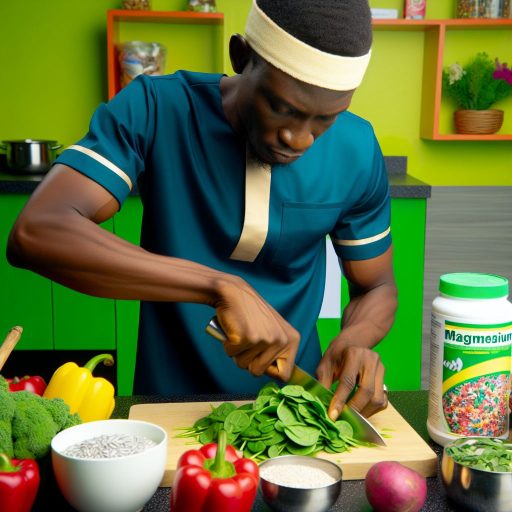Introduction:
Iron is essential for the body as it helps in maintaining overall health and well-being.
Consuming iron-packed foods is crucial to prevent iron deficiency anemia.
This blog post will focus on exploring iron-rich Nigerian foods for better health.
Iron plays a vital role in carrying oxygen in the blood and supporting overall energy levels.
Without enough iron, individuals can experience fatigue, weakness, and other health issues.
Iron deficiency anemia can lead to complications such as decreased immune function and cognitive impairment.
Incorporating iron-rich foods into the diet is crucial for overall health and well-being.
Nigerian cuisine offers a variety of options that are naturally rich in iron and other essential nutrients.
By adding these iron-packed foods to your diet, you can ensure that you are meeting your body’s iron needs.
Stay tuned to discover some delicious and nutritious Nigerian dishes that will help boost your iron intake.
Health Benefits of Iron:
Iron plays a crucial role in transporting oxygen in the blood and supporting energy production.
Adequate iron intake is essential for cognitive function, immune system health, and muscle function.
Meeting the daily recommended intake of iron is crucial for optimal health and overall well-being.
Iron is a vital mineral that plays a crucial role in various functions within the body.
One of the most significant roles of iron is its involvement in transporting oxygen in the blood.
Unlock the Power of Nigerian Food Minerals
Discover personalized Food Advisory tailored to boost your health or business using expert insights on Nigerian minerals.
Get StartedHemoglobin, a protein in red blood cells, binds to iron and carries oxygen from the lungs to tissues throughout the body.
Without enough iron, the body cannot produce enough hemoglobin, leading to a condition called anemia.
In addition to its role in oxygen transport, iron is also essential for energy production.
Iron is a key component of enzymes involved in the process of turning food into energy.
Without enough iron, the body’s ability to produce energy decreases, leading to fatigue and weakness.
Iron is also necessary for cognitive function.
Iron is involved in the production of neurotransmitters, which are chemicals that transmit signals in the brain.
Adequate iron levels are crucial for maintaining cognitive function, memory, and concentration.
Furthermore, iron is crucial for a healthy immune system.
Iron supports the production of white blood cells, which are essential for fighting off infections and foreign invaders.
Without enough iron, the immune system may become compromised, making the body more susceptible to illnesses.
Iron is also important for muscle function.
Iron is needed for the proper function of muscles, including muscle contraction and relaxation.
Without enough iron, muscle weakness and fatigue may occur.
Captivate Your Audience with Exclusive Nigerian Food Content
Imagine your platform enriched with unique, mineral-rich Nigerian cuisine stories that no one else can offer. Let's create content that resonates deeply and sets you apart.
Get StartedIt is important to emphasize the need to meet the daily recommended intake of iron to maintain optimal health.
The recommended daily intake of iron varies depending on age, gender, and specific health needs.
Consuming iron-rich foods is the best way to ensure an adequate intake of this essential mineral.
A diet rich in iron-packed Nigerian foods can provide the body with the necessary nutrients to support overall health and well-being.
Including a variety of iron-rich foods in your diet can help meet your daily iron needs and prevent iron deficiency.
Iron-Packed Nigerian Foods
- Red palm oil: Red palm oil is a staple in Nigerian cooking and is rich in iron, vitamin E, and antioxidants. It can be used for cooking, frying, and as a dressing for salads and soups.
- Beans: Beans are a great source of plant-based iron and are commonly consumed in Nigerian cuisine. They can be prepared in various dishes such as beans porridge, akara, and moi moi.
- Beef liver: Beef liver is a potent source of heme iron, which is more easily absorbed by the body compared to non-heme iron found in plant-based foods. It can be cooked in stews, soups, or grilled.
- Egusi soup: Egusi soup is a popular Nigerian dish made with ground melon seeds, vegetables, and protein sources like fish or meat. It is a delicious and nutritious meal that provides a good amount of iron.
- Snails: Snails are a delicacy in Nigerian cuisine and are rich in iron, protein, and other essential nutrients. They can be prepared in stews, soups, or grilled with spices.
Incorporating these iron-packed Nigerian foods into your diet can help ensure you are meeting your daily iron needs and supporting your overall health.
It is essential to consume a balanced diet that includes a variety of nutrient-rich foods to promote optimal health and well-being.
Iron is a critical mineral that plays a crucial role in various functions within the body, and meeting the recommended daily intake of iron is essential for maintaining good health.
Top Iron-Packed Nigerian Foods:
Ewedu:
Ewedu is a traditional Nigerian soup made from jute leaves and is rich in iron.
Per serving, ewedu contains about 2.5mg of iron, which is essential for boosting hemoglobin levels.
To incorporate ewedu into your diet, you can pair it with amala or eba for a nutritious meal.
Ora Soup:
Ora soup, also known as Oha soup, is a popular Igbo dish that is packed with iron.
A serving of ora soup typically contains around 2.8mg of iron, which helps in preventing anemia.
You can enjoy ora soup with fufu or pounded yam for a delicious and iron-rich meal.
Ogbono Soup:
Ogbono soup is another Nigerian favorite that is high in iron content.
One serving of ogbono soup provides approximately 2.3mg of iron, promoting healthy blood circulation.
Include ogbono soup in your weekly meal plan alongside your choice of swallow for a balanced diet.
Beans:
Beans are a staple in Nigerian cuisine and are one of the best sources of dietary iron.
A cup of cooked beans contains about 3.3mg of iron, aiding in the production of red blood cells.
Incorporate beans into meals like moi moi, akara, or as a side dish to increase your iron intake.
By including these iron-packed Nigerian foods in your diet, you can improve your overall health and well-being.
Remember to pair these dishes with other nutrient-rich foods for a balanced diet.
Uncover the Details: Potassium-Rich Nigerian Foods for Better Heart Health
Cooking Tips to Preserve Iron Content:
Here are some valuable suggestions to help you preserve the iron content in your Nigerian foods.
- Use minimal water when cooking: Excessive water can lead to loss of water-soluble nutrients, including iron.
- Avoid prolonged cooking times: Overcooking can cause the breakdown of nutrients, including iron.
- Pair iron-rich foods with vitamin C sources: Vitamin C helps enhance iron absorption in the body.
The Importance of Cooking in Iron Pots or Pans:
Cooking in iron pots or pans can significantly enhance the iron absorption in your foods.
Iron from the cookware leaches into the food during the cooking process, especially when cooking acidic dishes like tomato-based stews or soups. This can be beneficial for individuals who are at risk of iron deficiency or anemia.
When you cook in iron pots or pans, you are essentially fortifying your meals with an extra boost of iron, which can be beneficial for your overall health.
Simple Recipes Showcasing Iron-rich Nigerian Foods:
Here are some simple and delicious recipes that highlight the iron-rich properties of Nigerian foods.
- Classic Nigerian Spinach Stew: This stew combines spinach, tomatoes, bell peppers, and onions with iron-rich proteins like beef or fish.
- Beans Porridge: A hearty and nutritious dish made with beans, palm oil, onions, and spices, all cooked in an iron pot for enhanced iron absorption.
- Okra Soup with Chicken: A flavorful soup made with okra, tomatoes, onions, and chicken, cooked in an iron pot for added iron content.
These recipes are not only delicious but also packed with essential nutrients like iron that are vital for maintaining good health.
Gain More Insights: Essential Sodium Levels in Nigerian Traditional Dishes
Iron Absorption Factors:
Iron absorption in the body is influenced by various factors, both dietary and physiological, that can either enhance or inhibit the process.
Understanding these factors is crucial for ensuring optimal iron uptake and overall health.
Dietary Components:
- Phytates: Found in whole grains, legumes, and nuts, phytates can inhibit iron absorption by binding to the mineral in the gut.
- Tannins: Present in tea, coffee, and some fruits, tannins can also interfere with iron absorption when consumed in large amounts.
- Calcium: High levels of calcium, particularly from dairy products, can compete with iron for absorption in the intestines.
Balancing Iron Intake with Other Nutrients:
Iron absorption can be optimized by pairing iron-rich foods with enhancers such as:
- Vitamin C: Citrus fruits, bell peppers, and tomatoes are rich in vitamin C, which can increase the absorption of non-heme iron from plant-based sources.
- Copper: Seafood, nuts, and seeds contain copper, which plays a role in iron metabolism and can enhance iron absorption.
Tips to Improve Iron Absorption:
Here are some tips to help increase iron absorption and ensure adequate levels of this essential mineral in the body:
- Pair iron-rich plant foods with vitamin C-rich foods to enhance absorption, such as adding strawberries to oatmeal or squeezing lemon juice over spinach salad.
- Avoid consuming calcium-rich foods and iron-rich foods together, as calcium can inhibit the absorption of iron. Instead, space out the consumption of these nutrients throughout the day.
- Soaking, sprouting, or fermenting grains and legumes can help reduce phytate levels and improve iron absorption from these plant-based sources.
- Cooking foods in cast iron pots and pans can increase the iron content of meals, especially acidic foods like tomato sauce that can leach iron from the cookware.
By paying attention to these factors and implementing these tips, you can optimize your iron absorption and ensure that your body is getting the necessary amount of this essential mineral for better health.
Learn More: Magnesium Sources in Nigerian Cuisine for Wellness

Signs of Iron Deficiency:
Iron deficiency anemia is a common condition that occurs when there is a lack of iron in the body.
Recognizing the signs and symptoms of iron deficiency is crucial for early detection and treatment to prevent long-term health complications.
- Fatigue: One of the most common symptoms of iron deficiency is feeling tired and exhausted even after getting a good night’s sleep.
- Weakness: Iron is essential for the production of hemoglobin, which carries oxygen to the body’s cells. A lack of iron can lead to weakness and muscle fatigue.
- Pale Skin: A noticeable lack of color in the skin, particularly in the face, lips, and inner lower eyelids, can be a sign of iron deficiency.
- Shortness of Breath: Without enough iron, the body may not be able to produce adequate hemoglobin to carry oxygen to the tissues, resulting in shortness of breath and difficulty breathing.
It is important to seek medical attention if you experience any of these symptoms, as untreated iron deficiency can lead to more serious health complications such as anemia and heart problems.
Early detection and treatment of iron deficiency are key to preventing long-term health issues.
By maintaining a balanced diet rich in iron-packed foods, you can help prevent iron deficiency and maintain good overall health.
If you suspect you have symptoms of iron deficiency, it is important to consult a healthcare professional for proper diagnosis and treatment.
A simple blood test can determine your iron levels and help guide a treatment plan to restore your iron stores and improve your health.
You Might Also Like: Potassium-Packed Nigerian Foods for Heart Health
Cultural Significance of Iron-Packed Foods:
Iron-rich Nigerian foods hold a special place in traditional cuisine and celebrations.
Role in Promoting Communal Health:
- Iron-packed foods play a vital role in promoting communal health and well-being among Nigerians.
- These foods provide essential nutrients that help combat anemia and other iron deficiency-related conditions.
- Communities often come together to prepare and share meals featuring iron-rich ingredients, fostering a sense of unity and belonging.
- Through the consumption of these foods, families and communities prioritize health and vitality, strengthening social bonds in the process.
Personal Anecdotes and Stories:
- One particular anecdote that highlights the importance of iron-packed foods in Nigerian culture is the tradition of preparing “Ewedu” soup during weddings.
- Ewedu, a soup made from jute leaves and rich in iron, is believed to bring good luck and fertility to the newlyweds.
- Another example is the preparation of “Okra soup,” which is often served to guests during festive occasions as a symbol of prosperity and well-being.
- These stories underscore the deeply ingrained belief in the healing and nourishing properties of iron-rich foods within Nigerian culture.
Iron-packed Nigerian foods not only contribute to individual health but also hold a significant place in communal gatherings and celebrations.
By recognizing and honoring the cultural significance of these ingredients, Nigerians continue to prioritize wellness and connection in their everyday lives.
Incorporating Iron-Packed Nigerian Foods for Better Health
Incorporating iron-packed Nigerian foods into your diet is crucial for optimal health.
These foods provide essential nutrients like iron, which is vital for various bodily functions.
Consuming iron-rich foods can help prevent iron deficiency anemia and promote overall well-being.
It is important to include a variety of these foods in your meals to ensure you are getting an adequate amount of iron.
To maintain a healthy lifestyle, make an effort to include foods such as spinach, beans, and lean meats in your diet regularly.
These delicious and nutritious options can be easily incorporated into traditional Nigerian dishes for a flavorful boost.
We encourage you to share your favorite iron-rich Nigerian recipes or experiences with these foods.
By spreading knowledge and ideas, we can all benefit from the health benefits of iron-packed foods.
Let’s strive for better health together!




